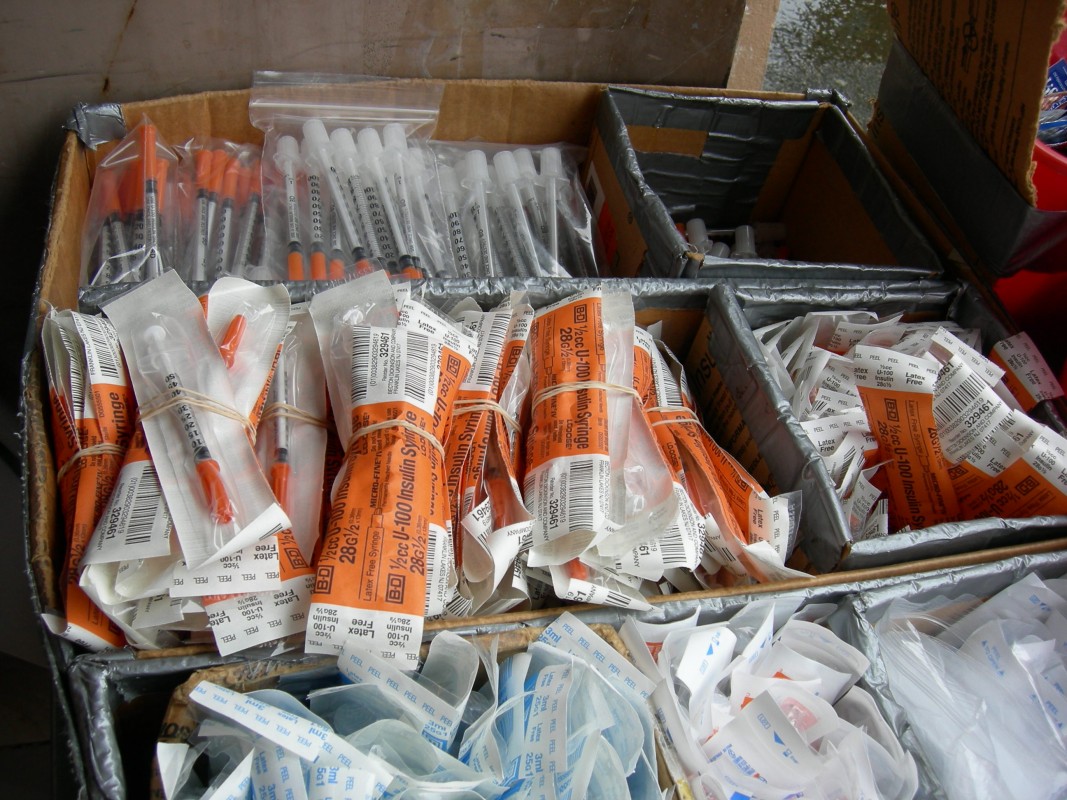UK needle exchanges reducing their hours or services due to the COVID-19 pandemic is putting people who inject drugs at risk of harm.
Needle and syringe programmes
Needle and syringe programmes (NSPs) have been present in the UK for decades, with the aim to reduce harms associated with drugs. NSPs are essential for harm reduction, providing sterile equipment for people who inject drugs (PWID) and Naloxone (the heroin antidote), to reduce overdose deaths.
Typically, a visitor to an NSP will receive clean needles and syringes, citric acid, cleaning wipes, spoons and filters. NSPs run from drugs services (or outreach vans) and pharmacies, and often signpost to, or have integrated within, other services, such as testing for blood borne viruses (BBVs). This reduces the infection risk and overall health impact of using drugs. Many PWID using NSPs are using heroin and crack cocaine, commonly injected together. However, NSPs also provide a service for users of other injectable substances, such as steroids.
COVID-19 restrictions
In March 2020, life changed for everyone in the UK, and the country went into lockdown due to COVID-19. There was confusion on what was deemed a ‘essential service’ and fears about how dangerous the novel virus was, causing the government to ask the country to ‘Stay Home’. However, PWID continued to buy and use drugs; many had no choice in the hands of their addiction. COVID-19 restrictions on movement led to some disruptions in the supply of illegal drugs. This was particularly dangerous for those dependent on heroin, and could have put further pressures on drugs services. Additionally, most frontline drugs work cannot be done remotely; it is difficult enough to access marginalised parts of the population in person, let alone in front of a screen.
NSPs in drugs services and pharmacies opened on a limited service, but struggled to access the most vulnerable PWID, with limited opening hours and reduced staff. They continue to be open in the January 2021 UK lockdown, but still with services limited. PWID who were at greatest risk were not able to access their usual services; however, many services were able to identify the most vulnerable, adapting ways of working to ensure PWID received sterile equipment, medication and support. Bristol Drugs Project started a home delivery NSP service, regularly visiting 70 people in 2020.
NSPs provide a link for marginalised PWID to the wider world.
Despite these adaptations to service delivery, research has suggested that PWID have been using NSPs less during COVID-19. This could increase BBV risks for PWID through the reuse and sharing of equipment. There are also further health and social consequences to less engagement with NSPs: missed safeguarding opportunities, decreased testing and treatment for BBVs, and fewer opportunities to collect other health and hygiene products, such as condoms and toothbrushes.
NSPs provide a link for marginalised PWID to the wider world. NSPs share essential public health messages, and in the current context of COVID-19, where messages are changeable and can be confusing, this is more important than ever. PWID experience stigma in society and NSPs may be the only place they access up-to-date health information. This clearly demonstrates the essential work taking place in NSPs.
PWID experience stigma in society, and are not prioritised in policy because of this.
With accessibility reduced in other services during COVID-19, even in person doctor appointments are limited. NSPs may be PWID’s only contact with health professionals in this time, yet PWID are at great risk of health harms. Drugs workers maintain positive relationships with PWID and for many, are the only health care professional PWID have an effective relationship with. PWID experience stigma in society, and are not prioritised in policy because of this. Drug related deaths in England and Wales have risen for the eighth consecutive year, from overdoses, BBVs, and other harms, yet the government continues to cut funding from services, and not prioritise NSPs as an essential service.
Marginalised groups, such as PWID, experienced many health inequalities prior to COVID-19, and to reduce services at this stage will only increase these further. NSPs provide a valuable and essential service to some of the most marginalised in our society, and offer opportunities to give tailored health and COVID-19 guidance, as well as drugs harm reduction. Continued reduced access could increase drug related harms and deaths. This costs the country more long term and disconnects PWID further from mainstream society and the health care they deserve.
Megan Coakeley is an advocate for drug decriminalisation, living in Bristol. She has a background working in housing and drugs services, and has recently completed an MSc in Public Health. She is campaigning for social change around drug use, harm reduction and the health gap to be closed. Contact: megancoakeley@gmail.com


